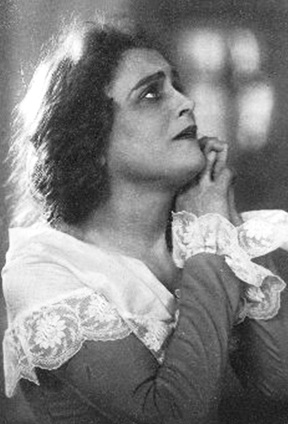Marija Leiko (Marija Leiko)

Actress. A Latvian-born star of German stage and screen, she later fell victim to Stalinist repression. Leiko made her performing debut at Riga’s Apollo Theatre at age 19. In 1908 her lover, actor Janis Guter, was suspected of involvement in the murder of a policeman, and the couple fled to Austria via Denmark. She studied at Vienna’s Imperial Academy of Music and Dramatic Art before moving to Germany in 1910, settling in Berlin in 1917. Highlights of her stage career were engagements with Max Reinhardt’s company (1917 to 1920) and at the National Theatre under Erwin Piscator (1926); her repertory included Ophelia and Gertrude in “Hamlet”, Gretchen in “Faust”, Natasha in “The Lower Depths”, and Elizabeth of Valois in “The Robbers”. The cinema offered Leiko a broader range, enabling her to tackle comedy and contemporary drama as well as costume epics. Her 26 screen credits include “Kain” (1918), “Lola Montez” (title role, 1919), director F.W. Murnau’s “Satanas” (1920), and “Die Rothausgasse” (1928). Three were directed by Guter, though their relationship had ended by 1919. At the end of the 1920s she had matured into matronly roles. She left films with the advent of talkies and returned to Latvia (then under Soviet control) after the Nazi takeover in Germany. Leiko had one daughter, Nora, who married a retired Soviet diplomat and lived in Russian Georgia. When Nora died in childbirth in 1935, the actress agreed to raise her granddaughter in Riga and traveled cross country to fetch her. On the return journey she was delayed in Moscow, where she accepted an invitation to become a permanent member of the Latvian State Theatre. This decision would cost Leiko her life. Xenophobia played a major role in Stalin’s political purges of the late 1930s, as the dictator was determined to eliminate foreigners (including Latvians) from positions of power and influence. In December 1937 the Latvian State Theatre was shut down and virtually the entire company, including Leiko, was arrested on fabricated charges of belonging to a “counter-revolutionary nationalist group” in league with fascists. Following a 10-minute “trial”, she was shot and buried in a mass grave at the secret NKVD killing field at Butovo, near Moscow. What became of her three year-old granddaughter is unknown. Leiko was “posthumously rehabilitated in absence of a crime” in 1958. Few of her silent films survive. (bio by: Bobb Edwards)
Born
- August, 14, 1887
- Latvia
Died
- February, 02, 1938
- Russia
Cemetery
- Butovo Shooting Range Memorial
- Russia

